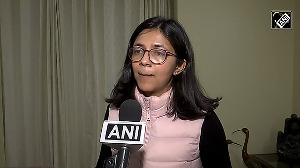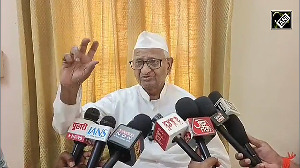The top rights panel in Pakistan has accused the government for being hand in glove with the radical Islamists and encouraging the Talibanisation of the country while attacks on minorities, particularly Hindus in Sindh, continue unabated.
"The lack of action after the excesses committed by the female students of the Jamia Hafsa in Islamabad exposes the deep-rooted links between the military and religious jihadi groups in the country," the Human Rights Commission of Pakistan has said.
The HRCP said the dire warnings of forced Islamisation, suicide attacks and the setting up of a Qazi court by the clerics running the controversial Lal Masjid are even grimmer.
It was not convinced by President Pervez Musharraf's assertion that the rampaging women armed with sticks are being tolerated for the time being to avoid large-scale violence in the event of a crackdown on the Islamists.
"This is ironic since over the past months, dozens of female political workers, labour leaders, NGO activists and others have been beaten by police with batons, dragged on the ground and their clothes ripped," the rights panel, headed by noted lawyer and activist Asma Jahangir, said.
The panel report has also highlighted the attacks on non-Muslim citizens across the country. "False cases have been registered against Hindus in Sindh, where they have been especially targeted as a means of political victimisation," the statement by the HRCP said. It has also mentioned "attacks on temples, churches and other places of worship."
"The trend of forced conversions, especially of young women, is continuing most notably in Sindh," the HRCP said.
Alleging that the intelligence agencies in the country was directly linked to the cases of missing persons, the HRCP has "demanded the setting up of a judicial commission to probe the cases."
"The official contention that these people had themselves left their homes, possibly to take part in 'jihad' is simply incredulous," the statement by the HRCP said.
The rights panel has also condemned the detention of political dissidents without the due process of law. "The treatment meted out to Akhtar Mengal of the BNP, who was held in a 'cage' while appearing before an anti-terrorism court in Karachi, is just one example of victimisation of Baloch nationalist leaders," it said.
Flaying the "blatant intervention in the judicial process by the military regime", it has praised the democratic aspiration of the citizens, especially the "struggle" waged by the lawyers against the removal of the chief justice of Pakistan to safeguard the judicial independence.
Highlighting the threat to the freedom of the media in the country, the HRCP said "journalists have been abducted, threatened and beaten as part of a campaign to suppress dissent."
It has mentioned the "picking-up" by agencies of the BBC's Dilawar Wazir in November last year and the abduction of Peshawar-based journalist Sohail Qalandar early this year.
"The mayhem inflicted by police within the offices of the Geo private channel in Islamabad is one of the worst incidents" while "other channels too have been warned to tone down criticism of the government," the panel said in a statement.






 © 2025
© 2025